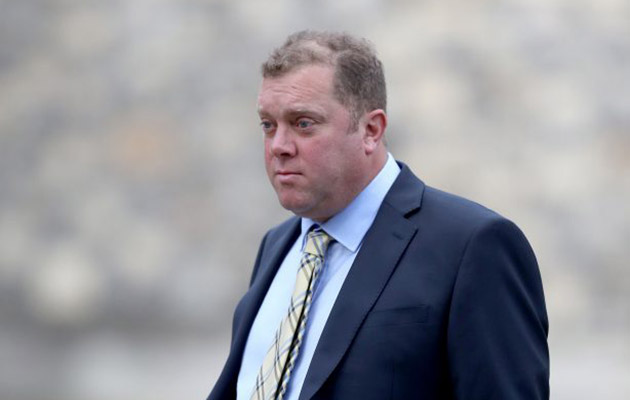Douglas Innes from Stormforce Coaching, which managed the Cheeki Rafiki, was described in court as "a cost cutting owner". He denies four counts of manslaughter by gross negligence
The prosecutor in the Cheeki Rafiki manslaughter case has told the jury at Winchester Crown Court that the yacht manager, Douglas Innes, failed to get the vessel checked ahead of its fatal last trip.
Andrew Bridge, 22, James Male, 22, Steve Warren, 52, and Paul Goslin, 56, all died when Cheeki Rafiki lost its keel while returning from Antigua Sailing Week to Southampton in May 2014.
Despite a search of the North Atlantic, the men were never found.
Innes, the director of Stormforce Coaching Limited, denies four counts of manslaughter by gross negligence.
He also denies a further charge of failing to operate Cheeki Rafiki in a safe manner between 18 March 2013 and 18 May 2014.
Cheeki Rafiki: Liferaft Found Unused

The upturned hull of Cheeki Rafiki
Prosecutor Nigel Lickley QC told the court that Innes “was responsible for the deaths and failed to do what a competent person in his position would do”, adding: “He turned a blind eye for profit and cut corners to save costs.”
The court heard that the yacht, which was managed by Stormforce Coaching Limited, had a Maritime and Coastguard Agency (MCA) category 2 charter code, which meant it could only be sailed up to 60 miles away from “a safe haven”.
Despite three years of hard racing and running aground three times, Cheeki Rafiki had also not been inspected by a qualified inspector before the trip, the jury heard.
Cheeki Rafiki lost its keel more than 700 miles from Nova Scotia in Canada.
Lickley also gave details of the events before the tragedy.
The jury heard that Cheeki Rafiki’s skipper Andrew Bridge had urgently emailed Innes when it became clear that the 40-foot yacht was taking on water and they were unable to identify the cause.
Innes, who was in the pub at the time, didn’t call the coastguard but went on to another pub and carried on drinking.
Mr Bridge then phoned Innes to say the situation onboard the yacht had got worse.
Innes then emailed the crew suggesting they checked the keel bolts. He also contacted the coastguard.
Lickley told the court that it was later found that a number of bolts had failed or broken, which cause the keel to detach.
“A number of keel bolts had broken, causing it to detach from the hull. Many were broken and it had been like that for months,” said Lickley.
“The yacht was therefore unsound, broken, and unsafe before the men left from Antigua.”
“The yacht was neglected and not maintained. As she was a commercial boat, she had experienced hard racing over three years and was not carefully looked after by Innes,” he stressed.
Innes also appears as a representative for Stormforce Coaching, which has also pleaded not guilty to failing to ensure the vessel was operated in a safe manner in accordance with section 100 of the Merchant Shipping Act 1995.
The trial continues.




